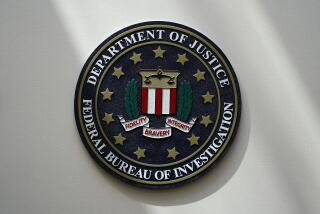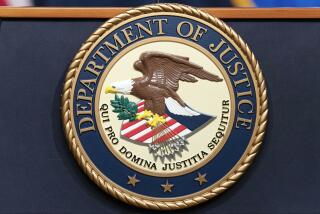Quiet Investigation Centers on Al Qaeda Aide in New York
- Share via
NEW YORK — As President Bush touted his record in the war on terror Thursday night at Madison Square Garden, another front in the terrorism fight was playing out nearby in the federal holding cell of a Pakistani American named Mohammed Junaid Babar.
Babar, who grew up in Queens, is a cooperating witness in an unfolding investigation of what authorities say may be a New York-based “sleeper cell” involved in Al Qaeda efforts to launch attacks in the U.S., perhaps as the Nov. 2 election approaches.
The investigation remains nearly invisible to the public, and federal authorities and defense lawyers have refused to discuss it.
But unsealed court documents show that Babar, 29, has admitted meeting with senior Al Qaeda members in remote South Waziristan in Pakistan this year as part of a scheme to smuggle money, night-vision goggles and other equipment to the terrorist network.
On June 3, he secretly pleaded guilty to charges of providing material support to a terrorist organization and agreed to cooperate in ongoing investigations.
“I understood that the money and supplies that I had given to Al Qaeda was supposed to be used in Afghanistan against U.S. or international forces,” Babar told the court.
Authorities believe three of the men Babar met with were involved in plotting attacks in London and perhaps the United States, using surveillance gathered during visits to New York, New Jersey and Washington, D.C., in 2000 and 2001.
Babar’s case is by no means isolated. Court documents and interviews show that U.S. authorities are conducting at least a dozen significant investigations throughout the nation into suspected support cells or operational cells of Al Qaeda, Hezbollah, Hamas and affiliate organizations.
These investigations -- and dozens of preliminary probes -- show the extent to which Al Qaeda maintains an active support network in the United States that is linked to its leaders on the Pakistan-Afghanistan border, its global network of cells and potentially to ongoing plots here and overseas, according to senior U.S. counterterrorism officials.
During his acceptance speech Thursday night, President Bush said his administration’s aggressive counterterrorism efforts had been successful in the three years since the Sept. 11 attacks.
Critics, however, say that at least some of the investigative activity unfairly targets innocent Muslims, and that all of the secret detentions, arrests and prosecutions have failed to uncover any proven terrorists in the United States.
Indeed, the Justice Department has had a mixed record in prosecuting alleged terrorism cell members in the United States; just this week, its first big terrorism conviction was thrown out of court by a federal judge in Detroit.
Such problems have raised questions about how successful the government has been in tracking terrorists, while skeptics ask if the terror threat is being hyped to bolster support for the Bush administration’s hard-line approach.
Several U.S. counter-terrorism officials acknowledged that they had no hard evidence that Al Qaeda operatives were living in the U.S. and readying a terrorist attack. But the officials, who have tracked Al Qaeda in the United States and overseas, said they operated every day under the assumption that the terrorist network had not just sympathizers but one or more teams of attackers ready and waiting in the country.
One U.S. official, whose specialty is tracking Al Qaeda, said, “The difference between now and 9/11 is they are now in a rabbit hole. But are they still here? You bet.”
Some of the investigations have been underway for months or even years. In others, the FBI, Department of Homeland Security and other agencies are pursuing recent leads generated through electronic intercepts and the capture and interrogation of suspected terrorists overseas and a review of their computers, cellphones and paper documents.
Several of the investigations involve alleged terrorism cells in New York and northern New Jersey, where suspected Al Qaeda operatives have been under intermittent surveillance since the early 1990s.
One focuses on local supporters of prominent Yemeni cleric Mohammed al Hasan al-Moayad and an aide, Mohammed Mohsen Yahya Zayed, who authorities contend have used a Brooklyn-based mosque, ice cream parlor and other businesses to funnel $20 million to Al Qaeda overseas, court documents show.
New York area authorities also continue to investigate whether local sympathizers helped another prominent cleric, Omar Abdel Rahman, the so-called blind sheik, communicate with leaders of an Egyptian-based terrorist organization while Abdel Rahman was imprisoned in Colorado. One U.S. postal employee is being prosecuted in that case.
Additional investigations in the New York region focus on other suspected Al Qaeda cells, as well as operatives believed to be providing clandestine support for alleged Al Qaeda affiliate groups such as Ansar al Islam and Egyptian Islamic Jihad as well as Hezbollah, a global terrorism network of its own, authorities said.
In Boston, authorities are investigating whether a Lebanese man who claims to have attended an Al Qaeda training camp is part of a larger sleeper cell in the region. Other probes focus on cities in Texas, Florida, Michigan and the Carolinas, authorities say.
And in California, authorities are pursuing leads that Al Qaeda is operating on both sides of the Mexican border, and that the group continues to be interested in launching attacks against high-profile targets in Los Angeles and San Francisco.
In some cases, authorities are closely monitoring suspects, often using secret wiretaps and search warrants obtained through the Foreign Intelligence Surveillance Act to determine whether they are raising money, recruiting operatives or providing logistical aid to terrorist groups, or even playing operational roles in plots against U.S. targets.
Authorities are also investigating several dozen other individuals and groups that have no visible connections to known terrorists, including two young men of Pakistani descent who were arrested last week on suspicion of plotting a “holy war” rampage in New York City. Authorities said those plans included blowing up subway stations, police precincts and bridges.
Babar’s case appeared to be unique, authorities said, in that he had admitted having personal contact with several high-ranking Al Qaeda members and playing a role in a plot by the group to blow up pubs, restaurants and train stations in London. Babar has admitted providing the London group ammonium nitrate and other materials to make bombs.
British authorities thwarted that alleged effort in March, arresting eight suspects. Authorities also seized 1,000 pounds of ammonium nitrate, a key ingredient in the 1995 bombing of the Alfred P. Murrah Federal Building in Oklahoma City and the bombing of two Bali discos two years ago.
Soon after the arrests, British authorities told their U.S. counterparts that Babar appeared to be a co-conspirator. He had already been placed on an FBI terrorism watch list, after a Canadian television program broadcast footage of him from Pakistan making inflammatory remarks.
Babar said he was a Muslim first, an American second, and that he wanted to fight with the Taliban against U.S. forces in Afghanistan and Pakistan.
“I’m willing to kill Americans,” he told the reporter on the program, even as he asserted that his mother had worked in one of the World Trade Center towers and barely escaped with her life on Sept. 11. He also said he would never return to New York.
But Babar did return to New York shortly after his meeting with Al Qaeda officials in Pakistan, and was put under surveillance. He was arrested April 10 by federal agents and local police as he drove to a taxi-driving class in Long Island City, Queens.
Babar began cooperating almost immediately, according to court records and interviews.
When visiting Pakistan, Babar said, he had brought cash, sleeping bags, waterproof socks and ponchos and other supplies for Al Qaeda operatives and their Taliban allies.
He also admitted participating in the London terrorism plots, and to personally setting up a “jihad training camp” in Pakistan and arranging lodging and transportation for recruits to attend.
Authorities say that while Babar was in Pakistan, he also met with key Al Qaeda operatives who conducted detailed surveillance of U.S. financial institutions for possible attack in 2000 and 2001.
Two of the operatives have since been arrested: suspected Al Qaeda communications specialist Mohammed Naeem Noor Khan, in Pakistan, and a London-based operative who authorities said was sent by the network to the United States several years ago to facilitate terrorist attacks on U.S. soil.
A third attendee, authorities believe, was Adnan El Shukrijumah, a trained pilot, accomplished bomb-maker and former South Florida resident. Shukrijumah, who remains a fugitive, has been identified by the FBI as the apparent mastermind of an Al Qaeda plot to launch a mass-casualty attack in the United States.
Authorities continue to “work” Babar to determine the extent of his relationship with those men and other Al Qaeda leaders, and to determine who else may have helped him funnel money and supplies to Al Qaeda.
They are seeking information about whether an attack was in the works, according to a source close to the investigation.
That source and others familiar with the case also confirmed that authorities were scrutinizing New York-based members of Al Muhajiroun, a religious group with ties to Babar that had been linked to Islamic extremism in other parts of the world.
“He’s a true believer,” one source, speaking on condition of anonymity, said of Babar.
The source said no one knew why Babar, who attended St. John’s University in New York for a year, was so eager to help Al Qaeda.
Babar, who was being held without bail, faces up to 70 years in prison. No sentencing date was set because of his agreement to cooperate.
More to Read
Sign up for Essential California
The most important California stories and recommendations in your inbox every morning.
You may occasionally receive promotional content from the Los Angeles Times.












